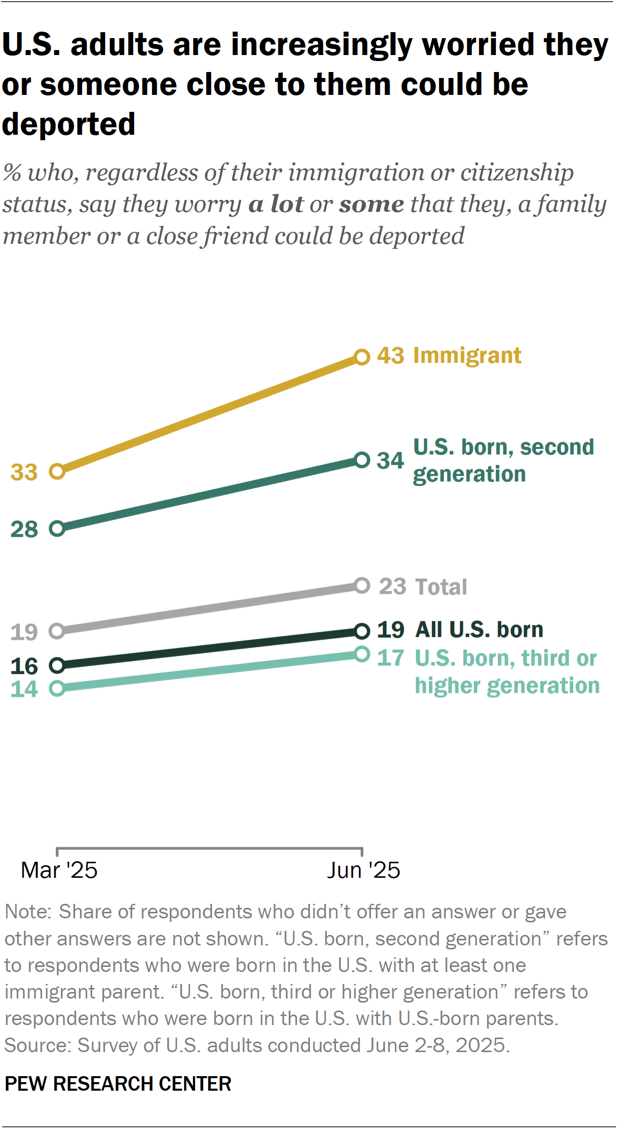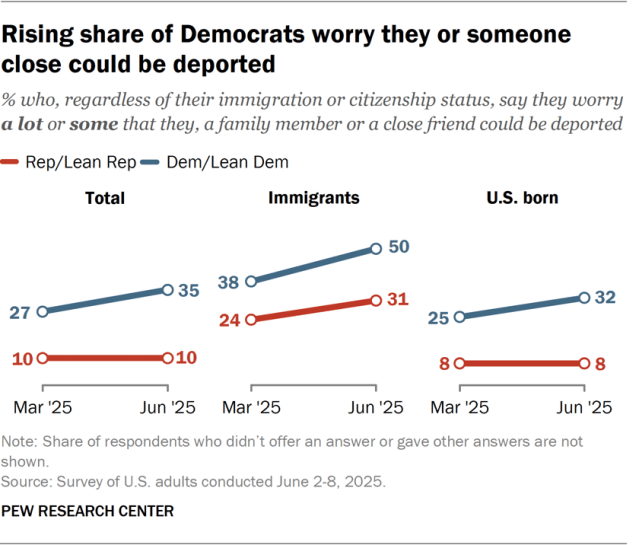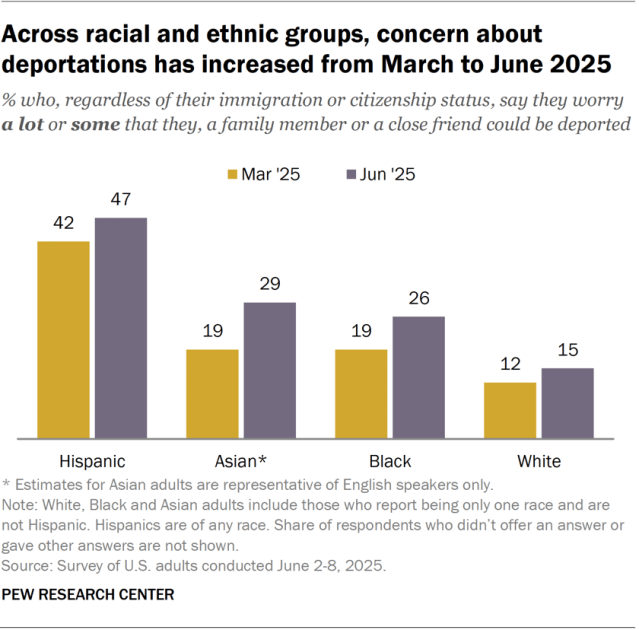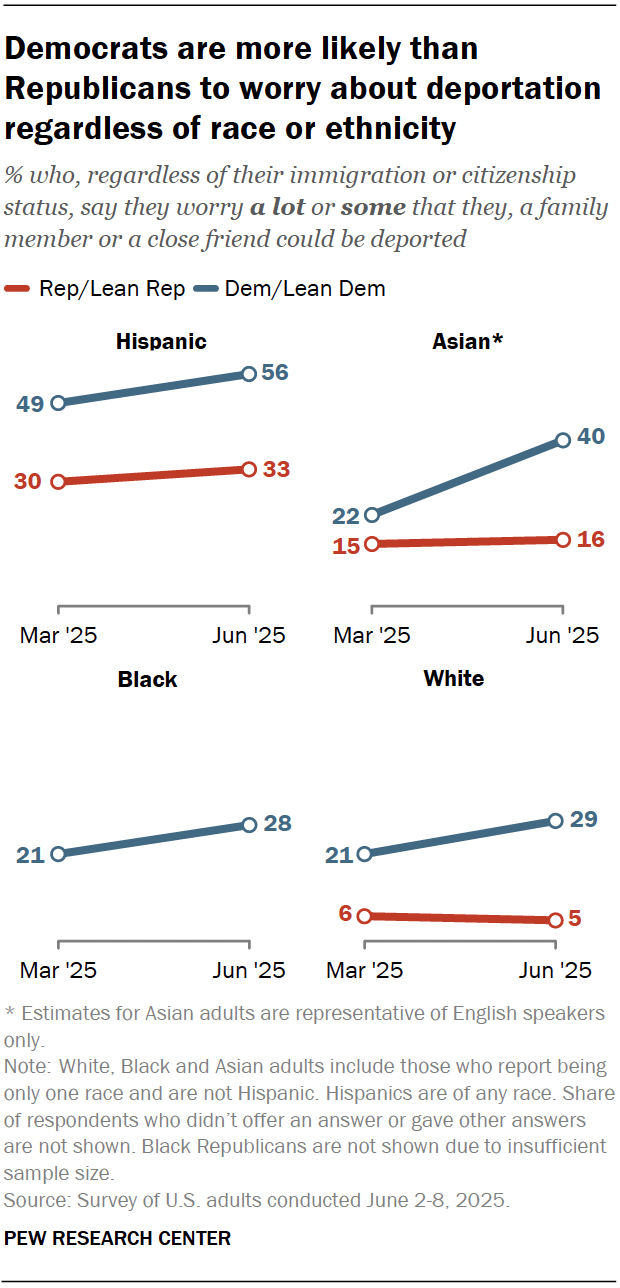About a quarter of U.S. adults (23%) say they worry a lot or some that they or someone close to them could be deported, according to a Pew Research Center survey conducted earlier this month. That’s up slightly from 19% in March. This comes as the Trump administration increases immigration arrests and deportations.

Immigrants are more likely than U.S.-born adults to worry about deportations impacting them, their family or close friends. About four-in-ten immigrants (43%) say they worry a lot or some, up from 33% in March.
Meanwhile, 34% of U.S.-born adults with at least one immigrant parent (second generation) are worried about deportations, as are 17% of those with U.S.-born parents (third or higher generation).
About three-in-ten U.S. residents (28%) are immigrants or are U.S. born and have at least one immigrant parent. In 2024, immigrants made up 15% of the country’s population, and second-generation Americans were another 13%, according to a Center analysis of U.S. Census Bureau data. That amounts to an estimated 93 million people.
Overall, a majority of U.S. adults say they either don’t worry much (18%) or at all (58%) that they or someone close to them could be deported.
The most recent survey was fielded June 2-8. That partially overlapped with Immigration and Customs Enforcement (ICE) raids in predominantly Latino communities in Southern California and protests in Los Angeles and across the country. More recently, President Donald Trump ordered stronger efforts in some major American cities to detain and deport immigrants living in the country illegally.
Related: Americans Have Mixed to Negative Views of Trump Administration Immigration Actions
Democrats are more likely than Republicans to be concerned that deportations will impact them, their family or close friends
More Democrats and Democratic-leaning independents are worried about deportations now than three months ago (35% in June vs. 27% in March). Fewer Republicans and Republican leaners worry about this, and their concern hasn’t changed in recent months (10% in both June and March).

Democrats are more likely than Republicans to worry about this among both immigrant and U.S.-born adults.
Among immigrant adults:
- 50% of Democrats worry they or someone close to them might be deported, up from 38% in March.
- 31% of Republicans say the same, compared with 24% in March.
Among U.S.-born adults:
- 32% of Democrats worry they or someone close to them might be deported, up from 25% in March.
- 8% of Republicans say the same, equal to the share who expressed concern in March.
Deportation concerns rise across racial and ethnic groups
Between March and June, worry about deportations increased across racial and ethnic groups.

Latinos are more likely than other groups to worry that they, a family member or a close friend could be deported. Roughly half (47%) now express some or a lot of concern, up slightly from March (42%).
Meanwhile, 29% of English-speaking Asian adults, 26% of Black adults and 15% of White adults currently say they are concerned about this.
This increase in worry about deportations across racial and ethnic groups is driven by growing concern among Democrats:

- 56% of Latino Democrats are worried they or someone they’re close to could be deported, compared with 49% in March.
- 40% of Asian Democrats express this worry, up from 22%.
- 29% of White Democrats now say this, up from 21%.
- 28% of Black Democrats express this concern, up from 21%.
The shares of Hispanic, Asian and White Republicans who are concerned that they, a family member or a close friend could be deported is virtually unchanged since March. (There were not enough Black Republicans in our sample to analyze their views separately.)
Note: Here are the questions used for this analysis, the topline and the survey methodology.


